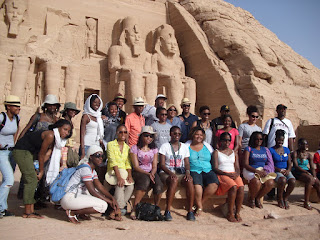
Our bags, heavy with new books and keepsakes, are being loaded onto the busses that will spirit us to Cairo International Airport and a flight back to New York. The students, their minds and tongues awash with concepts, figures and language from the world's parent civilization, hurtle back toward Howard with renewed intellectual vigor, reinforced as has been the case with the cohort of our two previous Kemet study abroad groups by a deep sense of purpose and mission. This year's initiative allowed two of the students of the world's foremost African scholar of Egyptian language and culture, Theophile Obenga, to bring together students from two Black universities and to initiate another university in its first study abroad in over a century of its existence. We have drunk once again from what Jacob Carruthers called "the deep well of African thought," this time in the company of students and faculty from three other universities in yet another unique undertaking. While here, the Presidential Commission on Academic Renewal completed its final recommendations. While reviewing them and reflecting on the past year of detailed discourse and exchange among our faculty, staff and students regarding the past, present and future uniqueness and direction of our beloved Howard, I lay our work here in Kemet alongside the work of this past year, looking and listening for lessons. A clear and familiar one emerged: our hope and aspirations are firmly rooted in the long view memory, genealogy and instruction left to us along the evidentiary pathways created by our Ancestors. There is no more credible, useful and, ultimately, fruitful intellectual work to be attempted and achieved. We return to Howard renewed, refocused and expectant that the fruits of this academic labor will continue to ripen and fortify the development of scholarship unique to the American and global academy. It is our duty. It is our charge. It is the mantra first set to language in the writings of PtahHotep in the late 25th century BCE, when he wrote "May this servant be instructed to make a staff of old age, that he might speak to him the words of those who have heard (sedjemew)." Our staffs will ripen under our instruction this Fall and in subsequent semesters and years. We must be prepared to invest them with the words of our Ancestors, literally "those who have heard."

No comments:
Post a Comment